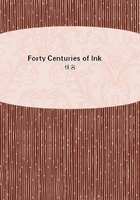
第47章
" 'We advise generally against the inks known simply as writing fluids--those not intended to yield a letter-press copy--because they are universally made, first, with as little solid matter as possible,--i. e. weak; second, with an excess of iron beyond that required to combine with the tannin, so as to develop all the color possible and flow with the greatest freedom. The combined writing and copying fluids, and the copying fluids on the other hand if properly made, may be justly recommended where permanency is the first requisition, particularly the older ones, which should be the most durable of all nut-gall and iron inks, because in them particularly concentration is aimed at, and the iron need not necessarily, and should not, be in excess of that required to combine with the tannin present. A steel pen during use injures, and often greatly, the durability of a writing ink by giving up iron to it.
" 'For your purpose, where extreme permanency is the first requisition, I should not advise the use of an ordinary writing fluid. Many manufacturers cannot obtain sufficient fluidity in their writing fluids without making their inks very dilute, and observing a particular method of manufacture which, although providing more attained color for a time, sacrifices the permanent quality of their color in a great measure. I should advise the use of an ink decidedly stronger.'
"The addition of water was almost universally condemned, for reasons stated later. As proof that this was not for the mercenary purpose of indirectly advising the use of more ink, some of the manufacturers said the ink should be kept in small-mouthed ink-stands, and when not in use should be as tightly sealed as possible, to prevent evaporation.
"In reply to the inquiry as to whether chemicals left in the paper ever obliterated the ink, several of the manufacturers said they knew of such cases, and all were agreed that, if the chlorides used for bleaching the paper were not washed out, they would dangerously affect any ink. The practice of mixing inks was universally condemned.
"Permanency against the action of time is the quality sought for in this investigation, and it is claimed that better evidence as to that quality is furnished by the test of time than by any other;and manufacturers have shown or referred to specimens of writing made with their ink many years ago, as proof of its merit in this particular.
If there was any surety that the standard of quality was always kept up in all of the oldest inks on the market, it would be safe to accept that test, but this may not be a fact; and, as has been stated, some of the recording officers believe that it is not.
Moreover, if only the old inks were to be accepted, it would be against the spirit of the age, which is to adopt the improvements which science makes possible; and manufacturers who at great cost of time and money have made improvements, would be deprived of the compensation which they deserve. The old inks were as a rule heavy, and had a tendency to settle; and the endeavor on the part of some manufacturers has been to preserve the permanency, and at the same time produce thinner inks which would be more agreeable to use.
"Improvements have been made in the direction of free-flowing inks, and these are fast becoming popular; and, while for correspondence and commercial uses they are undoubtedly sufficiently permanent, for records many of them are not, and it was with a view of preventing the use of these upon records that this investigation was made.
No attention has been given to the permanency of the inks, as against their removal by acids.
"The use of proper ink is considered so important by the British government that the inks used in the public departments are obtained by public tender, in accordance with the conditions drawn up by the controller of H. M. stationery office, with the assistance of the chief chemist of the inland revenue department, to whom the inks supplied by the contractor are from time to time submitted for analysis. Suitable inks for the various uses are thus obtained, and their standard maintained. The last form of 'invitation to tender,' or 'proposal,' as we term it, is appended, as being instructive.
I cannot learn that the United States government uses any such care as the British government in the matter of ink, although the question has been a troublesome one in the departments.
"The State department issues no special rules for determining suitable inks, or requiring that particular inks shall be used. Proposals are asked for the lowest bids for the articles of stationery required, the last form of proposal asking for bids upon seven black inks, one crimson, and one writing fluid, which are named.
"With the market full of inks worthless for records, the only safety for our records seems to be in the establishment of a system similar to the English, which shall fix upon proper inks for various uses, which all recording officers shall be required to use.
"I believe that the recording officers will be glad to have the question of permanent inks decided for them, and to know whether inks which were in use many years ago, and have stood the test thus far, are maintained at their old standard.
In the face of sharp competition among manufacturers, they fear they are not."Mr. Swan, proceeding still further, secured the services of two of the most distinguished professors of chemistry in this country, Messrs. Markoe and Baird, and submitted to them in camera sixty-seven samples of different inks, known only by numbers, for chemical analysis; in a long and exhaustive report on the work they had set out to accomplish, and also with a dissertation on the chemistry of inks in general, they complete their report as follows: